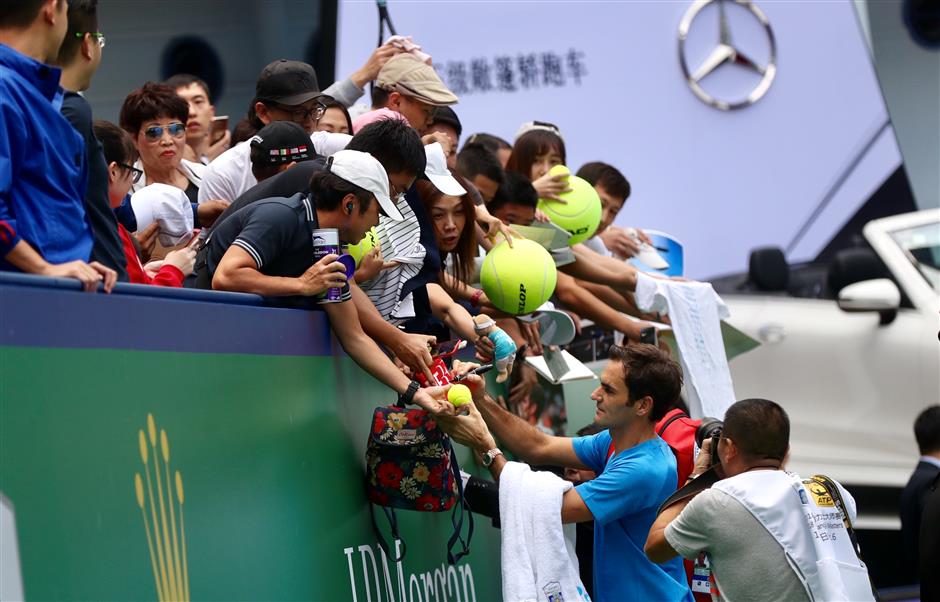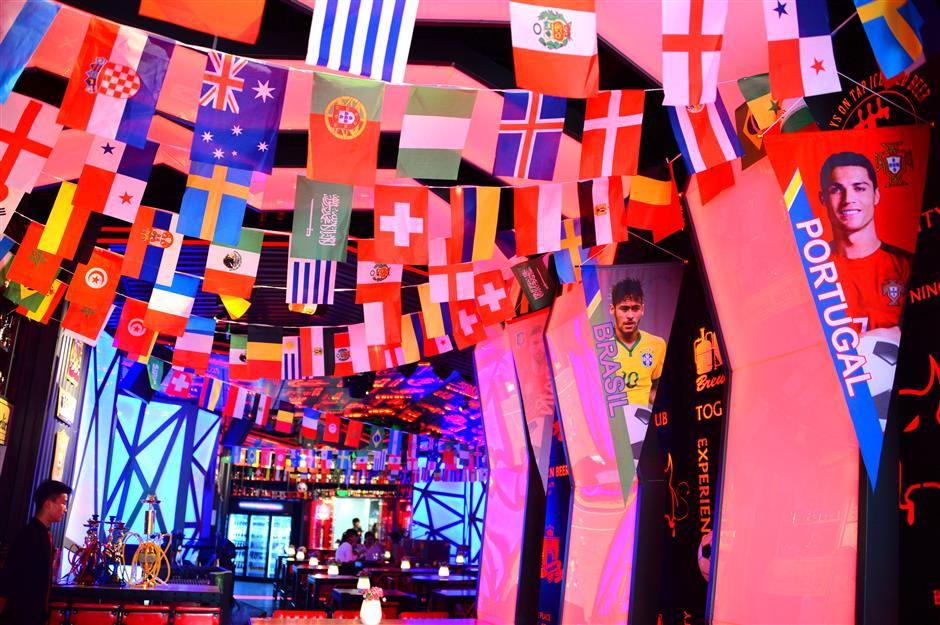When the reality of sports collides with expectations
Before the Shanghai ATP Masters, Jiang Lan switched off his mobile phone. Its a habit he has kept for years.
"I am afraid of receiving phone calls asking for tickets of the contest," he said. Jiang was chairman of the board in the Shanghai Jiushi (Group) Co. Ltd, which helps organize the event.
"Ordinary Chinese people are beginning to find an interest in sports. But their consumption habit can't change so easily and they are not used to spending so much money on the sport industry," Jiang added.
Infatuation or true love?
The year 2018 marked the 40th anniversary of China's reform and opening up, a period that has seen the Chinese economy grow at an astounding pace.
As peoples' living standards improved dramatically, they began to attach more importance to sports in their leisure time, whether to keep fit or as a pastime.
Now that China's per capita GDP has exceeded US$8,000, about 420 million people, accounting for 34 percent of the total population, are involved in various sports and physical exercise regularly.
But Jiang believes that for many of them, this crush on sports is merely infatuation, rather than true love.
"They would like to watch the ATP Masters, but are reluctant to buy tickets," he said. When they were given tickets, many find excuses not to attend. "The weather is bad, or their favorite player is out. All kinds of reasons," said Jiang.
He remembered seeing tents outside the stadium during the Wimbledon Championships. "And people queued for one returned ticket," he said. In contrast, some Chinese sports fans are wearing cheaper pirated team jerseys of their favorite clubs.
"This difference between Chinese and Western fans reflects the gap between our sports industries."
Jiang's view is shared by Gu Ye, Chairman of the board at Jiangsu Sports Industry Group Co Ltd. "Most of those who do physical exercises regularly are the young and the seniors," he said. "For an old man, all he needs to take part in sports might be just a pair of sneakers."
Jiangsu, in east China, is one of China's most wealthy provinces. In Jiangsu and China's business hub of Shanghai, per capita consumption in sports in 2017 was between 2,000 to 2,500 yuan (about US$296 to US$370). This is roughly the cost of a family feast in a high-end restaurant.

Fans ask for signature from Swiss tennis star Roger Federer during the Rolex Shanghai Masters in 2018.
Opportunity or illusion
Despite the reasons for caution about consumption prospects in the sports industry going forward, many insiders see opportunities ahead due to the expansion of China's middle income group.
In 2017, the volume of the sports industry in China topped 2.2 trillion yuan. It is expected to reach 5 trillion yuan in 2025.
In 2015, China Sports Media spent 8 billion yuan on a five-year all-media broadcasting authorization of Chinese Football Association Super League. The move gave a boost to the development of the sports industry.
"In retrospect, it gave people confidence in the value of China's sports industry," said Zhao Jun, CEO of CSM, who later admitted that the value of the event was over-estimated.
LeTV also banked on the prospects of the Chinese sports industry and acquired broadcasting rights for 310 sport events, including a two-year new media broadcasting authorization in the CSL, for which it gave 2.7 billion yuan to CSM.
But the dream was shattered quickly.
The empire of LeTV collapsed in the end of 2017 after its financial chain fractured. In its best days, LeTV had more than 3 million viewers, and saw revenue of about 1.8 billion yuan. But in 2016, LeTV had to pay 3 billion yuan for broadcasting authorization charges.
Then the price for broadcasting the CSL dropped to 11 billion yuan for 10 years. Even so, CSM found it hard to make ends meet.
"Piracy is a big problem," Zhao Jun said. In addition, viewers aren't in the habit of paying for sports events. "They are used to free viewing," she added. "It takes time to change, maybe even a generation."

A sense of optimism
After twists and turns, businesses in China's sports industry are becoming more sensible, although many still remain cautiously optimistic for the future.
Zhao Guochen is general manager of sports.qq.com, one of China's biggest portal websites for sport events. He noted that with the combined efforts of websites, free broadcasting of sport events is increasingly difficult to find.
"The young people, especially those born after 1990, are more susceptible to paid viewing," he said. "They are our main audiences."
Sports.pptv.com, another website focusing on sport events, had more than six million viewers who paid to watch in 2018, up from 1.3 million in the end of 2017.
But Mi Xin, vice president of Suning sports, parent firm of sports.pptv.com, takes a rational view. "Sports is only one area of our business," he said. Suning is better known for its online retailing in China. "Sport broadcasting is useful for attracting young people."
Tycoons Alibaba and China Mobile are also newcomers to the sports industry. China Mobile boasts more than 900 million mobile phone users and 100 million internet users. "Coming 5G technology might boost online broadcasting of sport events to a new level," said Zhao Jun.
Broadcasting websites are not alone in this development.
Fitness club Nirvana expanded from seven franchised stores in 2006 to 13 in 2018. Bian Guangming, the company's chairman of board, said the number will climb to at least 20 in 2019.
"We are happy to see that many of the young people born after 1990 or even 1995 joined our club.
The proportion of our young members is rising fast," he said.
Zhang Tao, CEO of Vango Sports, which started as fencing club, has his sights set on an even younger generation.
"Chinese young parents would like to have their children learn at least one sporting skill," he said.
"They are willing to invest in sports, and their children are our future customers in the sports industry."
Jiang Lan with Shanghai Jiushi believes that the disillusion of many companies is due to their misjudgement of the current situation in the sports industry.
"It is not a bad thing to bust these bubbles, which can make us take a more down-to-earth approach," he said.

A bar is decorated with World Cup elements in 2018.















